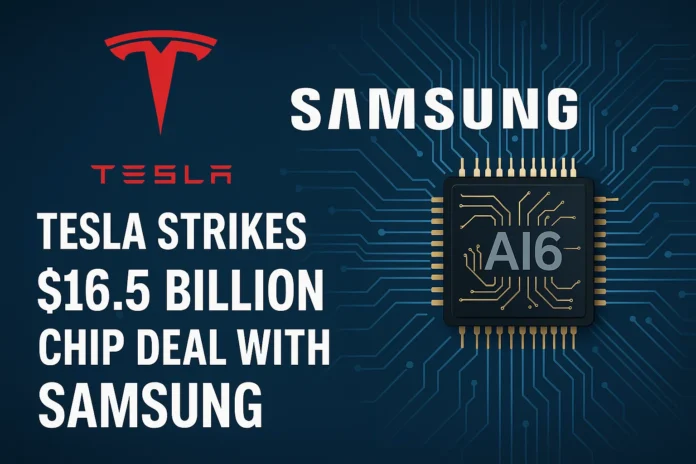Tesla Strikes USD16.5 Billion Chip Deal with Samsung: Introduction
In a groundbreaking move that may reshape the competitive dynamics of the global semiconductor and electric vehicle industries, Tesla has signed a USD16.5 billion agreement with Samsung Electronics to manufacture its next-generation AI6 chips. The chips will be produced at Samsung’s much-delayed and underutilized facility in Taylor, Texas, positioning the plant for a major revival after a long dry spell without clients.
A Lifeline for Samsung’s Foundry Business
For Samsung Electronics, the deal is more than a simple business win—it’s a potential lifeline. The South Korean tech conglomerate has been grappling with deepening losses in its contract chip manufacturing (foundry) division, which has struggled to gain ground against industry titan TSMC, holding a modest 8% of the global foundry market compared to TSMC’s commanding 67%, according to data from Trendforce.
The timing of our strategic partnership with Tesla could not have been more ideal. Analysts report that Samsung’s foundry division has been operating at a loss, estimated to exceed ₩5 trillion (~USD3.6 billion) in the first half of 2025. The firm had previously revealed the massive USD16.5 billion supply deal without identifying the client, citing confidentiality agreements. Three independent sources later confirmed to Reuters that the client is indeed Tesla.
Musk’s Involvement and Vision
Tesla CEO Elon Musk, known for his hands-on approach, confirmed the deal on X (formerly Twitter), stating that Samsung’s Taylor plant will manufacture Tesla’s AI6 chip. Emphasizing Tesla’s active role, Musk mentioned that his team would assist in optimizing production efficiency.
“Samsung agreed to allow Tesla to assist in maximizing manufacturing efficiency. This is a critical point, as I will walk the line personally to accelerate the pace of progress,” Musk said, highlighting the plant’s proximity to his residence as an added convenience.
He also indicated that the USD16.5 billion figure is only a baseline, with actual output potentially being “several times higher.”
Market Reactions and Strategic Impact
The announcement sent Samsung’s stock surging by up to 6.8%, hitting its highest level since September of the previous year. Tesla’s shares also saw a 1.9% increase in premarket U.S. trading. Market observers saw the action as a much-needed boost to Samsung’s faltering semiconductor aspirations.
According to Ryu Young-ho, senior analyst at NH Investment & Securities, the significance of the deal is substantial, particularly as Samsung’s Taylor fab had virtually no customers until now. In 2023, Samsung had even postponed ASML chipmaking equipment deliveries due to the lack of clients, pushing the operational launch of the Texas plant to 2026.
Timeline and Competition
Although an exact timeline for AI6 chip production hasn’t been disclosed, Musk had earlier hinted that the AI5 chips would debut by the end of 2026, suggesting AI6 could follow in 2027 or 2028. However, expectations are tempered by Tesla’s history of missing production targets.
Interestingly, Samsung already manufactures Tesla’s AI4 chips, which power its Full Self-Driving (FSD) systems. TSMC, on the other hand, is slated to produce AI5 chips in Taiwan and later in Arizona—signaling a diversified supply chain strategy by Tesla that spans global semiconductor leaders.
Broader Implications and Global Context
This major chip partnership coincides with intensified U.S.–South Korea trade relations, though it remains unclear whether the Tesla-Samsung deal is directly linked to bilateral discussions aimed at eliminating or reducing potential 25% U.S. tariffs on South Korean exports. Seoul is keen on expanding strategic cooperation with Washington in sectors like chip manufacturing and shipbuilding.
Samsung’s foundry segment has notably trailed in the AI chip race, falling behind competitors like SK Hynix and TSMC, both of which are capitalizing on the AI-driven chip boom through clients such as Apple, Nvidia, and Qualcomm. Samsung’s inability to retain high-profile clients has underscored technological challenges and prompted strategic reevaluation.
Conclusion
The Tesla-Samsung partnership marks a potentially transformative chapter in the semiconductor industry. While it revives Samsung’s Taylor facility, it also deepens Tesla’s commitment to in-house AI chip innovation. More importantly, it underscores the evolving synergy between EV manufacturing and chip design, blurring the lines between automotive and tech sectors. For both companies, this collaboration could become a keystone in their quests to redefine the future of mobility and intelligent computing.


